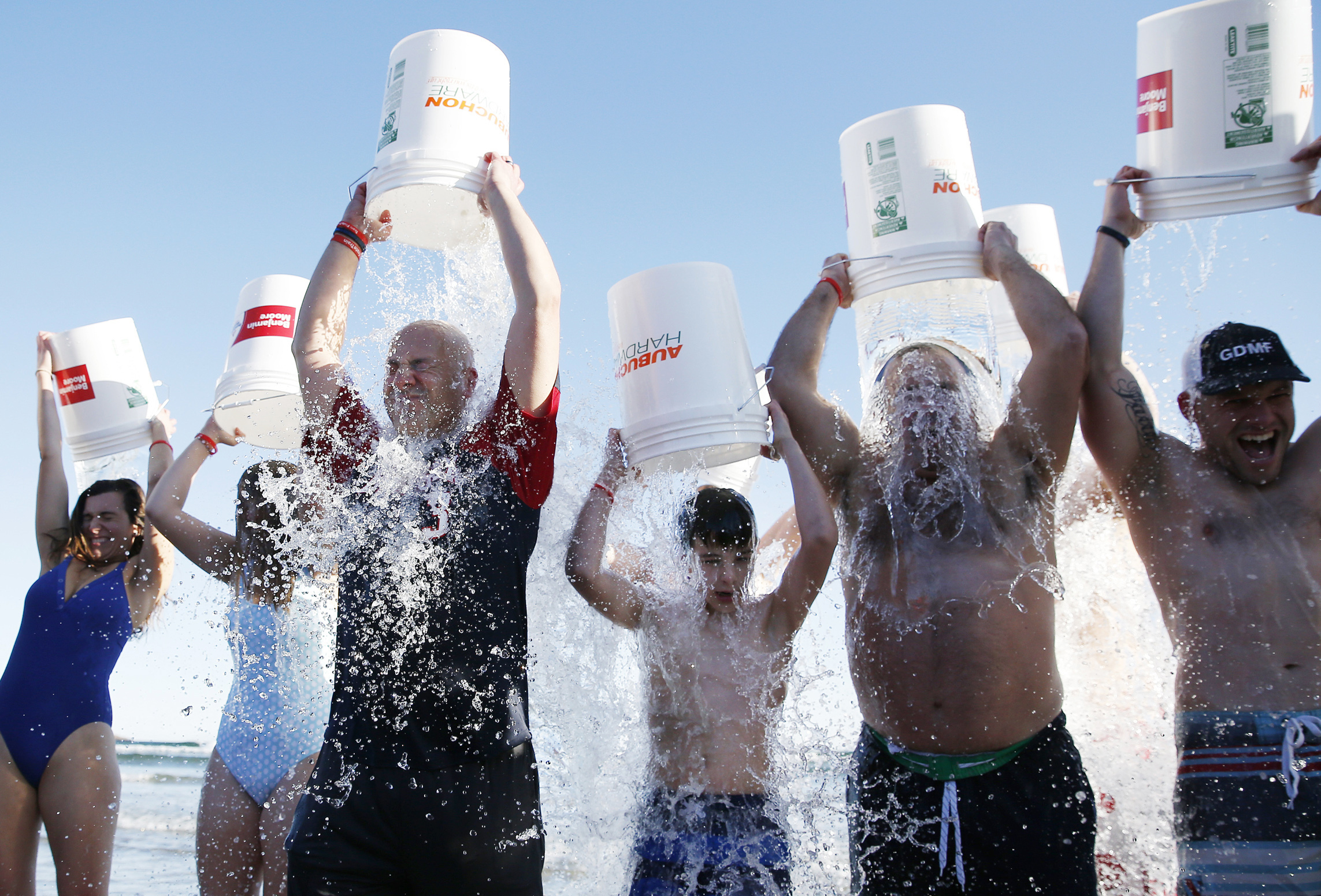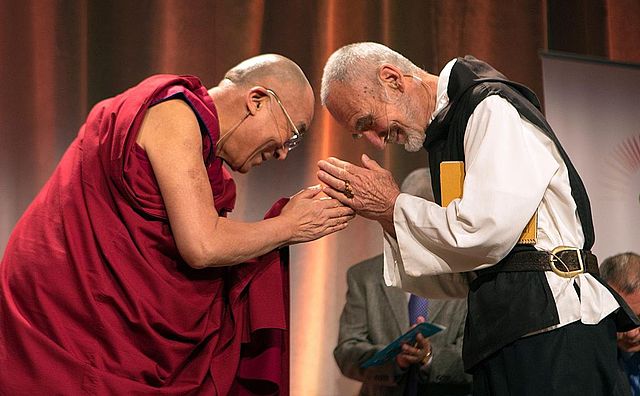If you’re reading this, you have access to the internet and this means you’ve heard (lots) about the ice bucket challenge. I won’t even describe it other than to mention that the amount of money it has raised is over $50M as of August 22. Given that about half of the mentions (or videos) of the challenge I’ve seen have been in the last few days, I’d bet that has gone up by a lot.
As with any viral social phenomenon (especially one about social causes), it’s also attracted a lot of backlash from anti-posts on social media to full-length pieces. For background, here are a few that I’ve seen:
- A straightforward anti piece on Vice
- A viral counter-video of an Australian newscaster refusing the challenge because other charities exist
- A viral counter-video of Patrick Stewart doing the challenge in a supposedly-classy way (as opposed to all those hucksters
- A somewhat-thoughtful but ultimately disappointing piece by the founder of Giving What We Can (an organisation whose work I generally like).
While I’ve railed against stuff like Kony2012 and might have hated the idea, my opinions about people’s motivations have changed a little bit. Also, Rebecca Watson posted a really great video criticising much of the criticism here (transcript included) which I think everyone should read/watch:

While there are some problems and potential negatives associated with the challenge, I think most of the criticism is wrong. Here’s a list of most of the arguments I’ve been seeing:
- It’s annoying: Sure, I might also find it spamming my social media feeds. But in that case, I simply have to scroll down or hide the post or mute the hashtag etc etc. But let’s say I’ve gone to the effort of speaking out against the ice bucket challenge because it’s annoying. This means that I consider its annoyance to me (and its perceived annoyance to others) to outweigh the benefit of the money it’s raised. Are you really saying your 2 seconds to scroll past the bucket challenges is more important than some major charities getting $50M? I hope not but if so that should be the dictionary entry for privilege.
- The ice bucket is unnecessary/just donate the money: Why can’t we all be like Patrick Stewart and just write a check? Well sure, you can and it’s generally a good thing to do. But since the donations went viral, this means that many people ONLY learned about and donated to the cause because of the ice bucket. So what you find annoying is what actually raised the money. Sure, it’s fine to lament that human nature is such that it takes a gimmick to make it go viral. But again, to speak out against the viral aspect directly is to say that the decorum of [what you consider to be] a dignified charity campaign is more important than the results. That’s bass-ackwards.
- It’s “narcissism masquerading as altruism”/those people don’t care about the charity etc: This is bad old Kant rearing his head again. Apparently what matters most about charity (or any moral action) is the intention. The intention has to be “pure” and “authentic” otherwise what’s the point of curing a disease? Oh, except for the actual effects. But no, that’s not truly moral. It’s wrong to feel good about doing something good — that might distract you from your duty to be a perfectly Platonic moral being. Also charities shouldn’t market themselves and have to “sell” the product, since that’s not derived from pure intention. If you’re not in the right state of mind to save a drowning child, don’t bother. Just in case you’re not aware of the actual harm these attitudes have caused charities (and the people they’re trying to help), watch this video. The other problem is that if you’re going to assume cynical motives and say that the ice bucket challenge is “just” social signalling for others, I can turn that around — being outraged at the ice bucket challenge is “just” social signalling.
- It’s slacktivism: I might write a whole post about it but I’m starting to believe slacktivism isn’t a real problem. I think it’s a term born of smarm, used to deride certain types of action. It’s uncomfortably close to “the internet isn’t real” and its crappy cousin “you should accept shittiness (eg. harassment) online because it isn’t real”. I doubt many people who participate in such viral memes actually think clicking Like cures disease. It’s also a bit rich to label something that’s raised $50M as slacktivism. Finally awareness IS a thing. It might not be for something like breast cancer, but believe it or not there are causes that do not get a chance to get better because people don’t actually know about them.
- There are other/more important causes: I don’t see how getting yourself wet and donating $10 commits you to a lifetime of supporting nothing but ALS. (If it did, it would certainly contradict the claim that viral memes don’t matter!) Again, who actually believes no other causes exist because of the challenge? As for more important causes, maybe. But if I had one cause that I think is most important (nutrition and food security), by this logic I should be railing against other forms of charity because I think there’s something more important out there. Which would be pretty crappy of me.
- It’s wasting water: This is one there might be something to and I’d support calls for something like using non-potable water, limiting the size of the bucket or doing it over a bath or some other receptacle to collect the water. But to me, the critics are using this as a talking point and not acting out of concern for water. It is conspicuous wastage to spill 10-15L on the ground. By the logic of the critics though, they should be going after eating steak, a kilo of which uses 1000-1500 buckets of water. Interestingly, Patrick Stewart wasted much more energy and possibly water in creating his bucket full of ice cubes but he’s been praised by the critics. This is still the strongest criticism but even so I’d rather the critics were more consistent.
- It can encourage moral licensing: This is based on the article by the Giving What We Can founder and relates to research that doing something good can cause people to believe they’re “entitled” to do something bad as a reward. To paraphrase one commenter, I make sure I’m always an asshole so that I don’t experience moral licensing! Potentially, if lots of people feel really good about it then it might be an interesting thing to study. As Rebecca Watson said though, it’s far from conclusive and would apply to any giving done socially.
- It cannibalises donations from other charities: Again, argued by the Giving What We Can founder. To take this seriously, we should condemn all charities that do any advertising because of the potential to cannibalise donations. A moral ad can only be targeting people to give incrementally. The effect of this would be to end the charitable giving sector as a whole.

The bottom line is the challenge has some positives and some negatives. The good is that it’s raised a lot of money and made people participate in social giving which may lead to increased expectations and normalising giving. I also have a feeling it’s reached a lot of people who normally don’t donate anything. The discussion has also encouraged people to think about charities and the ethics of giving.
The negatives are the harm in the waste of water and perhaps a potential for some psychological backfiring. Also, ALS simply got lucky as there’s no clear connection between the ice bucket and the cause so perhaps it might be teaching people to give to a cause that sounds good without researching it. There’s also a potential for overfunding (more here).
Either way, there are no obvious reasons to be shitting on this and if you are, I suggest examining your own motivations as well.





0 Comments